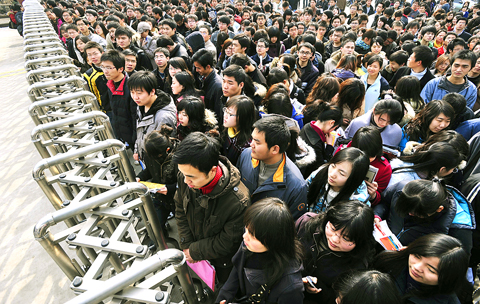China’s economy may have already reached bottom and its emergence as a major industrial power will continue for years, Australia’s central bank chief said yesterday.
Australia, now teetering on the edge of a recession, has “plenty of potential” to benefit from China’s long-term growth, Reserve Bank of Australia Governor Glenn Stevens said.
Chinese economic growth had “slowed down far more than was anticipated” late last year, Stevens told a routine parliamentary inquiry into the Australian economy.

PHOTO: AP
“There are some data sets that show something that looks like a bottom,” he said, referring to Chinese economic indicators for last month.
Reports have shown a rise in bank lending and a slower rate of contraction in manufacturing.
Stevens said it was too early to tell whether the “tentative indications of a turn for the better in China” would continue.
“I think what we’ve had is a reminder that China is an economy that has business cycles like all of us and it was never going to grow every year at 12 percent,” he said.
“It seems to me still the case that the emergence of China as a large industrialized economy has years and years to run,” he said.
“So it will be a volatile ride on occasion as it is today, but I can’t believe that the emergence has finished and it seems to me that Australia has plenty of potential to benefit from that over the long run as we did for the last couple of years,” he said.
Australia’s 17-year run of economic growth before the current slump was tied to burgeoning Chinese and Indian demand for its raw materials such as iron ore, coal and natural gas.
Hopes that a Chinese economic recovery might be taking shape were dampened by figures that showed China’s exports plunged 17.5 percent last month amid waning global consumer demand.
Meanwhile, the central bank was prepared to cut interest rates further but they are unlikely to drop to near zero as they have in some other countries, Stevens said.
“We’ll be prepared to go low enough to what is needed,” he said. “It is not my present expectation we’re going to find ourselves at nothing.”
The bank has slashed a total of 400 basis points off the official rate since September, taking it to a 45-year-low of 3.25 percent this month, on concerns over the impact of slowing world growth.
In the US, the federal funds target rate is zero to 0.25 percent while Japan’s key lending rate is 0.1 percent.
Stevens said Australian market expectations were “toying” with a bottom in the cash rate of 2.0 percent or 2.25 percent and he had “no particular desire to encourage or disabuse them” of those expectations.
“The long-run prospects for Australia have not deteriorated by as much as we may all be feeling just now,” he said.

MORE VISITORS: The Tourism Administration said that it is seeing positive prospects in its efforts to expand the tourism market in North America and Europe Taiwan has been ranked as the cheapest place in the world to travel to this year, based on a list recommended by NerdWallet. The San Francisco-based personal finance company said that Taiwan topped the list of 16 nations it chose for budget travelers because US tourists do not need visas and travelers can easily have a good meal for less than US$10. A bus ride in Taipei costs just under US$0.50, while subway rides start at US$0.60, the firm said, adding that public transportation in Taiwan is easy to navigate. The firm also called Taiwan a “food lover’s paradise,” citing inexpensive breakfast stalls

TRADE: A mandatory declaration of origin for manufactured goods bound for the US is to take effect on May 7 to block China from exploiting Taiwan’s trade channels All products manufactured in Taiwan and exported to the US must include a signed declaration of origin starting on May 7, the Bureau of Foreign Trade announced yesterday. US President Donald Trump on April 2 imposed a 32 percent tariff on imports from Taiwan, but one week later announced a 90-day pause on its implementation. However, a universal 10 percent tariff was immediately applied to most imports from around the world. On April 12, the Trump administration further exempted computers, smartphones and semiconductors from the new tariffs. In response, President William Lai’s (賴清德) administration has introduced a series of countermeasures to support affected

CROSS-STRAIT: The vast majority of Taiwanese support maintaining the ‘status quo,’ while concern is rising about Beijing’s influence operations More than eight out of 10 Taiwanese reject Beijing’s “one country, two systems” framework for cross-strait relations, according to a survey released by the Mainland Affairs Council (MAC) on Thursday. The MAC’s latest quarterly survey found that 84.4 percent of respondents opposed Beijing’s “one country, two systems” formula for handling cross-strait relations — a figure consistent with past polling. Over the past three years, opposition to the framework has remained high, ranging from a low of 83.6 percent in April 2023 to a peak of 89.6 percent in April last year. In the most recent poll, 82.5 percent also rejected China’s

PLUGGING HOLES: The amendments would bring the legislation in line with systems found in other countries such as Japan and the US, Legislator Chen Kuan-ting said Democratic Progressive Party (DPP) Legislator Chen Kuan-ting (陳冠廷) has proposed amending national security legislation amid a spate of espionage cases. Potential gaps in security vetting procedures for personnel with access to sensitive information prompted him to propose the amendments, which would introduce changes to Article 14 of the Classified National Security Information Protection Act (國家機密保護法), Chen said yesterday. The proposal, which aims to enhance interagency vetting procedures and reduce the risk of classified information leaks, would establish a comprehensive security clearance system in Taiwan, he said. The amendment would require character and loyalty checks for civil servants and intelligence personnel prior to